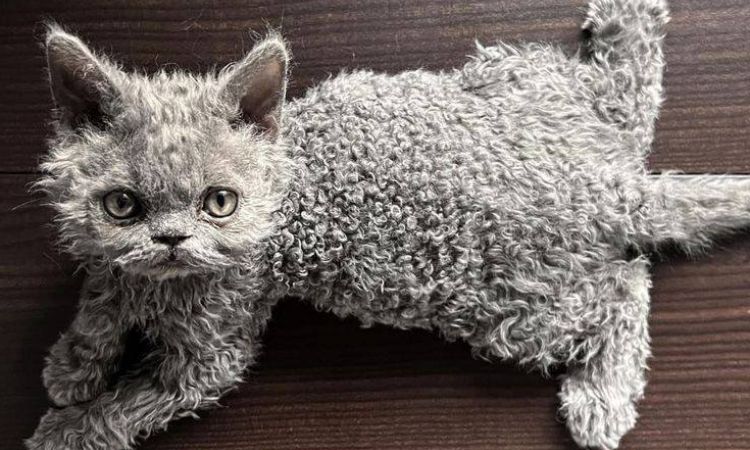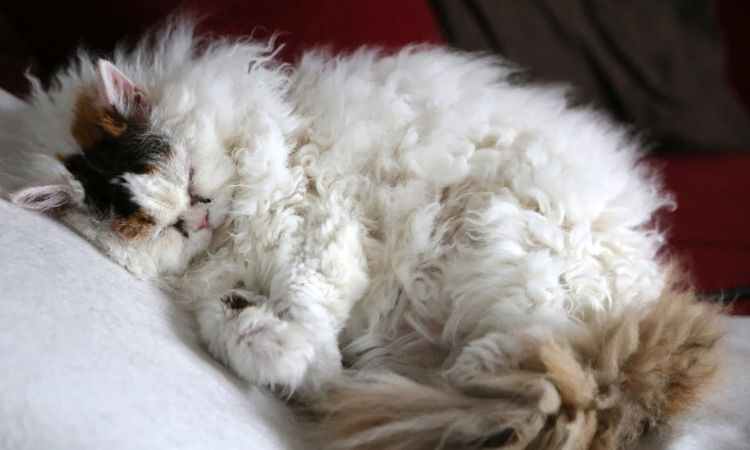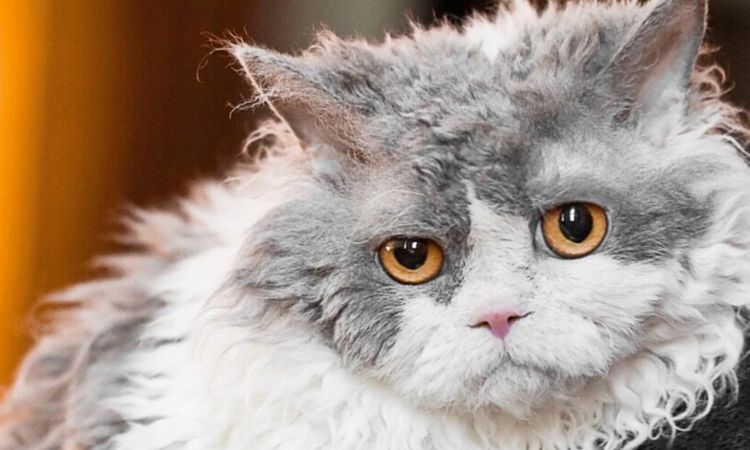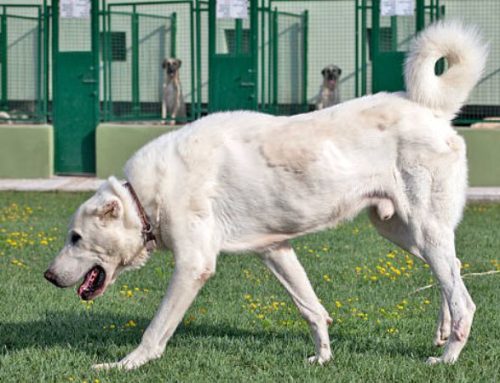Meet the Selkirk Rex, the charming “teddy bear” of the cat world, with a coat of soft, playful curls that instantly invites a scratch or cuddle. Unlike their sleeker cousins, the Devon Rex and Cornish Rex, Selkirks carry a plush, voluminous curl that makes them look as if they’ve stepped straight out of a storybook.
Curious about their personality, care, or whether these curly-coated companions are truly hypoallergenic? Keep reading to uncover everything you need to know about Selkirk Rex cats, from price to grooming tips.
Are Selkirk Rex Cats Hypoallergenic
No, Selkirk Rex cats are not hypoallergenic. While their curly coats may seem like they would produce fewer allergens, these cats still produce the same allergens as other cats. The primary allergens in cats are proteins found in their saliva, urine, and skin cells (dander). These allergens can cause allergic reactions in sensitive individuals, regardless of coat type.

That being said, some people with mild allergies might find that they react less to Selkirk Rexes compared to other breeds because their curls may help trap dander, reducing the amount that gets into the air. However, if you have severe cat allergies, it’s still likely that you’ll experience symptoms even with a Selkirk Rex.
Regular grooming and cleaning, along with minimizing exposure, can help manage allergic reactions, but no breed is truly 100% hypoallergenic. If you’re allergic to cats but still want a furry friend, it’s best to spend time with the breed first to see how your body reacts before making a commitment.
Selkirk Rex Cat Price and Ownership Costs
Initial Cost: Breeder vs. Adoption
- Adoption:
- Adopting a Selkirk Rex from a shelter or breed-specific rescue typically costs $75 to $150. However, Selkirk Rex cats are relatively rare in shelters, so you may need to be patient or use adoption platforms to find one. Breed-specific rescues may sometimes offer Selkirk Rex cats, but they are not as commonly available as other breeds.
- Reputable Breeder (Pet Quality):
- Buying from a reputable breeder for a pet-quality Selkirk Rex generally ranges from $500 to $800. Pet-quality cats are typically not intended for show or breeding but are perfect as family companions. The price can vary based on breeder reputation, geographic location, and the specific cat’s coat quality.
- Show Quality:
- A show-quality Selkirk Rex, which meets higher standards for pedigree, appearance, and potential for competition in cat shows, can exceed $1,500. These cats come from breeders with established reputations, and their price may rise based on factors like lineage, coat quality, and whether the breeder participates in major cat associations like CFA or TICA.
Factors Influencing the Selkirk Rex Price
- Geographical Location and Breeder Reputation:
- Prices for a Selkirk Rex may vary based on geographical location. Breeders in urban areas or places with high demand for purebred cats might charge more. Additionally, the reputation of the breeder can significantly influence the cost. Highly regarded breeders with a track record of healthy, well-socialized cats may charge premium prices.
- Coat Length and Curl Quality (Longhair vs. Shorthair):
- The length and quality of the coat are key price factors. Longhaired Selkirk Rex cats typically command higher prices due to the extra care needed in breeding and maintenance. The degree of curl in the coat also plays a role: cats with more defined and uniform curls might be more expensive than those with looser, less uniform curls. Shorthair varieties are generally less costly but still possess the breed’s signature plush, curly texture.
- Inclusions: Spay/Neuter, Vaccines, Microchipping, and Registration:
- Reputable breeders typically include the cost of spaying/neutering, initial vaccinations, microchipping, and TICA/CFA registration papers in the price of the cat. These inclusions provide peace of mind that your new pet will be healthy and properly registered. However, some breeders may offer these services as add-ons, which can increase the overall cost.
Long-Term Financial Commitment
- Routine Vet Visits and Vaccinations:
- As with any pet, Selkirk Rex cats require regular veterinary care. Vet visits typically cost between $50 to $200 per visit, depending on the location and the services required (e.g., general check-ups, vaccinations). Annual vaccinations for common diseases (such as feline calicivirus, rabies, and distemper) are essential for maintaining their health.
- Quality Diet:
- A healthy, well-balanced diet is crucial for the Selkirk Rex’s well-being. High-quality cat food, especially those rich in Omega fatty acids to support their unique coats, can cost anywhere from $30 to $60 per month, depending on the brand and dietary needs.
- Pet Insurance Considerations for Genetic Conditions:
- Selkirk Rex cats may be prone to genetic conditions like Hypertrophic Cardiomyopathy (HCM) and Polycystic Kidney Disease (PKD). It’s advisable to consider pet insurance to help manage potential treatment costs for these conditions. Pet insurance premiums typically range from $20 to $60 per month depending on the coverage, age, and health of the cat. Having insurance can help you manage the financial impact of unexpected health issues.
Comprehensive Selkirk Rex Care and Grooming

1. Coat Care: Maintaining the Curly Fur
The Selkirk Rex’s curly coat is undoubtedly its most captivating feature, but it requires proper grooming to prevent matting and ensure it remains soft and luxurious.
Brushing and Comb Care
- Frequency: Brush your Selkirk Rex once or twice a week using a wide-toothed comb. Be gentle to avoid damaging their delicate curls. Over-brushing can flatten their natural waves.
- Preventing Matting: Curls can easily tangle, especially around the neck and belly area. Regular brushing will help prevent matting and keep the coat looking its best.
- Coat Quality: Selkirk Rex cats shed moderately, but regular grooming helps manage loose hair and keep your home tidy.
Bathing
- Frequency: Selkirk Rex cats may need an occasional bath to maintain their coat’s natural oils and prevent oil buildup, which is common in curly-haired breeds.
- Shampoo: Use a cat-specific shampoo designed for sensitive skin. Gently rinse and blot dry to maintain the bouncy texture of their curls.
2. Nail and Paw Care
Keeping your Selkirk Rex’s nails and paws in good shape is important for their comfort and health.
- Nail Trimming: Trim your cat’s nails every 2–3 weeks to prevent overgrowth and discomfort. Be careful not to cut too close to the quick.
- Scratching Posts: Provide scratching posts to allow your Selkirk Rex to maintain its claws naturally and satisfy its scratching instincts.
3. Ear, Eye, and Dental Care
Selkirk Rex cats have sensitive ears and eyes that require regular care to prevent infections and other issues.
Ear Care
- Frequency: Check your cat’s ears weekly for dirt, wax buildup, or debris. Clean them gently with a soft cotton ball or tissue. Regular ear checks help prevent infections.
Eye Care
- Frequency: Wipe away any discharge or tear stains with a damp cloth. Tear staining can occur in some Selkirk Rex cats, and cleaning their eyes regularly helps maintain their appearance.
Dental Hygiene
- Brushing: Regular brushing is essential for preventing dental issues. Use a toothbrush and toothpaste designed for cats. Aim to brush their teeth at least a few times a week.
- Dental Chews: Offering dental chews or toys can help reduce plaque buildup and support overall dental health.
4. Nutrition for Healthy Coat and Overall Health
A balanced diet plays a crucial role in keeping your Selkirk Rex’s coat shiny and healthy, as well as ensuring they stay active and happy.
Quality Diet
- Protein-Rich Food: Feed your Selkirk Rex high-quality, protein-rich food to support their active lifestyle and maintain their lush coat. Dry food and raw options like chicken thigh fillet (without bones) are ideal choices.
- Fresh Water: Always provide fresh water for hydration, as curly-coated cats can sometimes be prone to skin issues related to dehydration.
Treats and Supplements
- Treats: Opt for healthy, cat-safe treats that support dental health or provide enrichment during playtime.
- Supplements: Omega fatty acids are beneficial for maintaining a soft and glossy coat. You can consult your vet about adding supplements to your Selkirk Rex’s diet.
5. Mental and Physical Stimulation
Selkirk Rex cats are moderately active and thrive in environments that provide both mental and physical stimulation.
Interactive Playtime
- Toys and Play: Provide interactive toys, climbing trees, and cat furniture for exercise and mental stimulation. Engaging your Selkirk Rex in daily playtime will keep them both physically fit and mentally sharp.
Social Companionship
- Affectionate Nature: These cats are social creatures that thrive in environments where they receive attention from their human family members or other pets. They enjoy companionship and aren’t fond of being left alone for long periods.
6. Veterinary Care and Health Maintenance
Routine veterinary checkups are essential for maintaining your Selkirk Rex’s health. These cats are generally robust but may inherit certain genetic conditions due to their diverse ancestry.
Routine Vet Checkups
- Frequency: Schedule regular vet visits once or twice a year for wellness exams. These visits help detect potential health issues early, especially genetic conditions such as hypertrophic cardiomyopathy (HCM) and polycystic kidney disease (PKD).
- Vaccinations: Ensure your Selkirk Rex receives core vaccinations, including those for feline viral rhinotracheitis, feline calicivirus, panleukopenia, and rabies.
Spaying/Neutering
- Recommendation: Spaying or neutering is recommended unless you are breeding. This helps prevent health issues and contributes to their overall well-being.
7. Special Considerations for Selkirk Rex Cats
While the Selkirk Rex is generally a calm and loving breed, there are a few considerations to keep in mind to ensure they thrive in your home:
- Sensitivity to Cold: Like most Rex breeds, Selkirk Rex cats are sensitive to cold temperatures due to their dense coats. Keep your home warm in winter or consider dressing your cat in a cozy sweater if necessary.
- Indoor Living: Selkirk Rex cats do best in indoor environments where they are safe and well-cared for. They are playful and affectionate, so having another cat or pet around can provide extra stimulation.
Caring for a Selkirk Rex involves regular grooming, attention to their special needs, and providing them with a loving, stimulating environment. With their charming personalities and signature curly coats, these cats make wonderful companions. By following this comprehensive care and grooming guide, your Selkirk Rex will remain healthy, happy, and by your side for many years to come.
Health, Lifespan, and Temperament
Health Overview
While Selkirk Rex cats are generally healthy, they can inherit certain genetic conditions due to their ancestry from Persians, British Shorthairs, and Exotic Shorthairs. Responsible breeders screen for these issues to reduce risks. Common health concerns include:
- Polycystic Kidney Disease (PKD): A genetic condition that causes cysts in the kidneys, potentially leading to kidney failure. Testing of parent cats is recommended to prevent passing PKD to offspring.
- Hypertrophic Cardiomyopathy (HCM): A heart condition that thickens the heart walls, potentially causing heart failure. Regular veterinary checkups are essential for early detection.
- Progressive Retinal Atrophy (PRA): A rare genetic eye condition that can cause vision loss. Genetic testing is advised if the cat is intended for breeding.
Routine veterinary visits, vaccinations, and preventive care (flea, tick, and parasite control) help maintain overall health. Pet insurance can also be valuable to offset potential medical costs associated with these conditions.

Lifespan
Selkirk Rex cats are moderately long-lived, typically reaching 14–15 years, with some living into their late teens when provided with proper care, nutrition, and regular veterinary checkups. A balanced diet, regular exercise, and mental stimulation all contribute to a longer, healthier life.
Temperament and Personality
Selkirk Rex cats are renowned for their gentle, loving disposition. They have a laid-back and patient nature, often described as “teddy bear-like.” Key traits include:
- Affectionate but independent: They enjoy cuddling and spending time with humans, but they aren’t overly demanding.
- Playful and curious: While calm, Selkirk Rexes love interactive toys, climbing, and exploring their environment.
- Sociable: They generally get along well with children, dogs, and other cats, making them ideal for family life.
- Adaptable: Selkirk Rex cats adjust well to new routines and environments, as long as they receive companionship and mental stimulation.
Despite their playful and social nature, Selkirk Rex cats do not thrive in isolation. They prefer homes where they have company, whether from humans or fellow pets.
Selkirk Rex cats are a unique blend of charm, intelligence, and cuddly appeal. Their distinctive curly coats and affectionate personalities make them a captivating addition to the right home, while their care requirements and potential health considerations highlight the importance of informed ownership. Whether you’re drawn to their playful antics, gentle temperament, or striking appearance, understanding the breed’s grooming, nutrition, and medical needs ensures your Selkirk Rex thrives as a happy, healthy companion.






